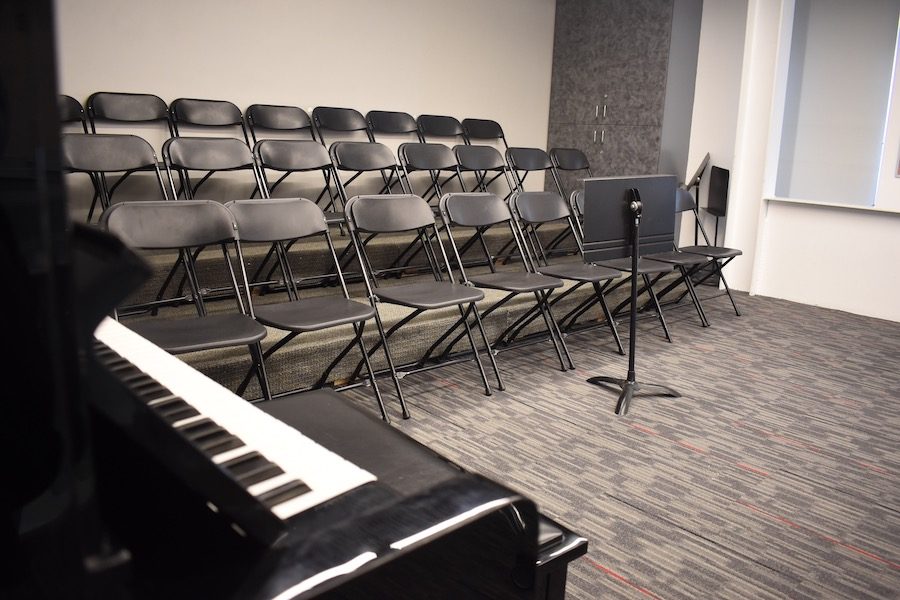Health department adds another three weeks to babysitting ban as two more whooping cough cases are reported at school
New all-clear date is Dec. 28. Until then, students should stay away from babies and others vulnerable to whooping cough
CANCELLED: Choirhawk practice was cancelled until after three of 23 singers were diagnosed with pertussis. Dr. Julie Higashi of the LA County Health Department said singing could make the virus easier to spread.
January 1, 2019
A fifth documented case of pertussis among Shalhevet students diagnosed Dec. 7 extended the dates recommended to avoid babysitting to Dec. 28, when the 21-day period between exposure and becoming sick hopefully will have passed for everyone at school.
Los Angeles Public Health Department specialist Dr. Julie Higashi said winter break, which continues until Jan. 2, would probably end the rash of cases at school.
“The winter break is happening at the right time,” Dr. Higashi said. “It’s just a close community. There’s something great about the close relationships and people, but it’ll give this 10-day period of time to quiet things down.”
Despite the increase in cases, she said this could not be considered an “outbreak” of the disease — also known as whooping cough — because there is no official definition of an outbreak for pertussis. She wasn’t sure why but said it was probably because the illness is only dangerous to a very few demographics.
“Usually we say there’s a certain number of cases that defines an outbreak, but here
we need to be careful about using terms,” Dr. Higashi said. “I think it’s just because we don’t track these clusters of cases very carefully in general, because in general pertussis can be deadly in babies under one and a serious disease, but it generally isn’t considered a fatal disease.”
However, because there are six faculty members with infants under one year old, Dr. Higashi has recommended that students should avoid babysitting, especially for faculty members and others who have children in that age group.
In addition, choir director Mrs. Joelle Keene cancelled two weeks of practice when a third case of the illness was diagnosed among the Choirhawks.
Mrs. Keene posted a Schoology message on the Choirhawks page explaining why she had cancelled choir practice until Jan. 2. She said she had discussed the situation with Dr. Higashi, who is a specialist in infectious disease.
“[Dr. Higashi] said singing tends to ‘aerosolize respiratory secretions,’ which I imagine means to make particles smaller,” Mrs. Keene wrote in her email. “When you sneeze, you sneeze larger droplets, and everyone knows and so you use a tissue or whatever. But when you sing, the same thing that would be a droplet is instead a spray, more of a mist, and no one is aware of it. Which would make it easier to spread in a singing group.”
Freshman Danielle Finn, who sings alto in the group, was Shalhevet’s fifth student diagnosed with pertussis. She was tested Dec. 6 after two weeks of cold symptoms and chest tightness, and was diagnosed on Dec. 8.
Danielle said her doctor was initially doubtful that she had pertussis because her symptoms did not include coughing. Most other cases, including seniors Josh Sarir and Hannah Friedman, experienced intense coughing and difficulty breathing prior to their diagnosis.
“The doctor said it’s not whooping cough, but I asked him to test it,” Danielle said. “But two days later, the results said I had it, and now I’m on antibiotics and everyone in my house is on it also.”
She missed five days of school as required and returned the following Friday.
In a Boiling Point interview, Dr. Higashi said whooping cough is difficult to control because there is no official protocol for dealing with it for physicians. After the first two cases, an email was sent to parents to alert them, which included a letter from the Health Department urging parents to take students to the doctor if they showed symptoms, and to mention they’d been exposed to pertussis at school.
While Dr. Higashi said students should be treated before being officially diagnosed, but many doctors don’t. Empiric treatment — that is, treatment based on what you see, such as pertussis-like symptoms combined with many other students being diagnosed, rather than what a lab result shows — enables doctors to administer antibiotics sooner, minimizing time students must miss school due to contagiousness.
“The kids have this letter from the school, but I don’t think the doctor has the right communication to make the decision about what to do,” Dr. Higashi said. “At least one of the kids got empiric treatment appropriately, because this physician was really tuned in to the Health Department type of approach, but not all doctors are tuned to that. Some kids didn’t get treated until their doctor received the test back, and that’s a reason why they might have gone back to school while they were still infectious.”
Josh, the first student to be diagnosed in early October, said that his pertussis has caused him to take better care of himself. He still does not feel back to normal.
“My symptoms have not changed, rather have lessened,” Josh said in an email interview.
He said he has changed his sleeping habits and drinks more water, habits which have helped him feel better.
“I have started drinking an average of 200 oz of warm water a day. I go to sleep super early, usually around 9:30 – 10 p.m.,” Josh wrote. “My coughing has become less frequent, but the mornings and late nights are still difficult.”
Get the latest from The Boiling Point. Sign up for our news feed.
Dr. Higashi said that though Shalhevet has not fully prevented the spread of pertussis, the school has handled the situation well.
“This is the issue that we’re looking at now: how do schools track these things?” she said. “It’s really difficult for a school like Shalhevet to pretty much set up its own surveillance, to have one person whose task it is to track all of this stuff.
“I think Shalhevet did more than most schools do to raise awareness about what to do. I want to commend the school for trying to get the word out and actually getting kids tested, because that was important.”
The 21-day period after exposure was Nov. 30 for the first case, Dec. 9 for the third case, Dec. 17 for a fourth, and now stands at Dec. 28 — 21 days after the last case was diagnosed. The fourth student did not reveal his or her identity, but others did.
As of December 25, there had been no new case of pertussis reported to the health department among Shalhevet students since Danielle, Dr. Higashi said.














